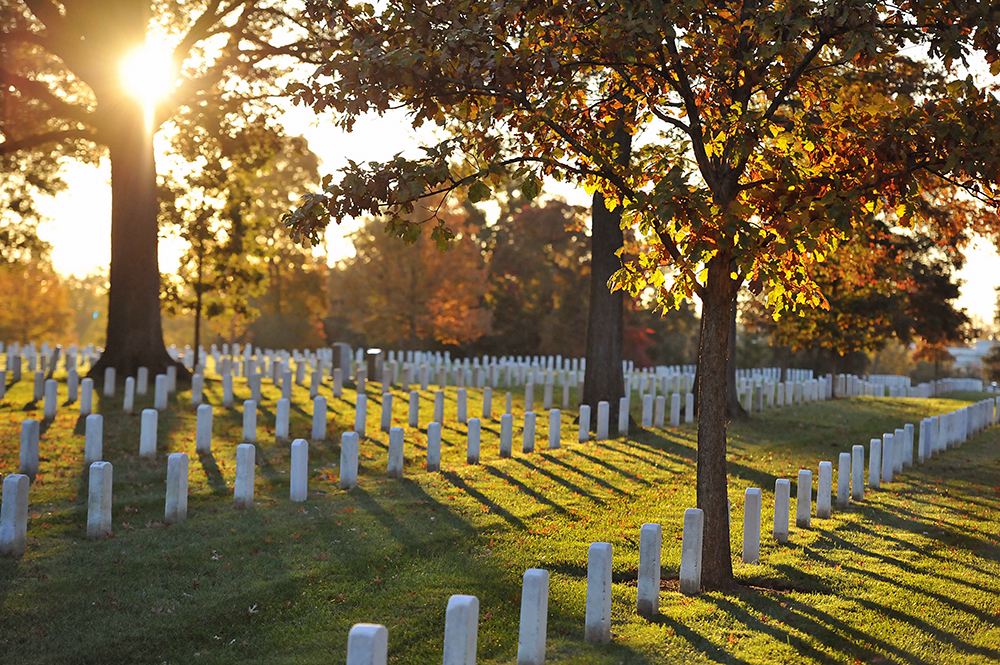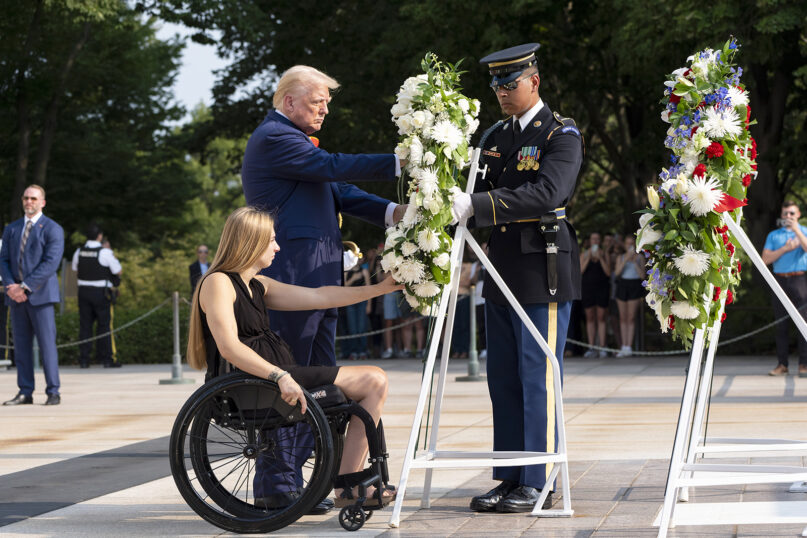(RNS) — There’s little question that Donald Trump planned to use his visit to Arlington National Cemetery a week ago to electioneer; that he was informed that federal law forbids such activity at military cemeteries; and that he went ahead anyway, posting a video of the visit on social media.
Quite apart from the controversy over the physical altercation that occurred between a cemetery employee and campaign staffers during the visit, the reaction has been that the former president has once again run roughshod over a norm of public behavior. “Trump’s appalling desecration of Arlington National Cemetery shows he still can’t be trusted,” ran the headline on Marla Bautista’s USA Today column.
Military cemeteries have long been modern nations’ most sacred spaces — civil religious shrines where those who have fought and died in their country’s wars are memorialized for their service and sacrifice. In the United States, the legal prohibition on campaign activity in these spaces testifies to the conviction that the American civil religion exists above and beyond partisan politics.
Arlington is the foremost of our military cemeteries, and this is not the first time a president has been accused of desecrating it.
In the December 1997 issue of The Washington Times’ magazine Insight, an article titled “Is There Nothing Sacred?” charged the Clinton administration with making burial plots in Arlington available by special waiver to big campaign contributors. Although it identified no waived beneficiaries and quoted only unnamed sources, the article quickly became the outrage du jour of conservative talk radio and was given wide exposure by the daily press.
It would be an “insult to America’s most hallowed national cemetery to make an Arlington burial just another perk for political contributors,” editorialized the Omaha World-Herald. The story, said the Arizona Republic, “does, in fact, carry the cache [sic] of outrageous truth.”

The sun rises over Arlington National Cemetery, Nov. 5, 2011. (U.S. Coast Guard photo by Petty Officer 2nd Class Patrick Kelley/Creative Commons)
While it did not take long for the administration to prove the article groundless, no one disputed that the outrage could have taken place. As New York Times columnist Maureen Dowd put it, “What you need to know about Bill Clinton is that the charge was plausible.”
Like Trump, Clinton was perceived as a transgressor against American civil religion. Before Gravegate, there had been the bona fide scandal of Bedroomgate. The previous February, investigations into Democratic fund-raising practices disclosed that the Clintons had put up 938 guests in the White House’s Lincoln Bedroom, and scores of these turned out to have gained the invitation because of the size of their campaign contributions.
“Political Cash Grab So Sleazy It Dirties Lincoln’s Bedroom,” ran the headline on Donn Esmonde’s Buffalo News column. “Isn’t it a shame?” lamented the Louisville Courier-Journal.
“Selling the Lincoln Bedroom is not a high crime or misdemeanor,” pronounced syndicated columnist Charles Krauthammer. “But it is offensive.” “[T]he image of guests racing in and out of White House bedrooms like something out of a Feydeau farce makes it clearer than ever that Mr. Clinton was presiding over an operation that was out of control and demeaning to the government,” sniffed The New York Times.
Bedroomgate and Gravegate only dimly foreshadowed the civil religious panic caused by Monicagate, wherein Clinton was revealed to have engaged in sex acts with a White House intern in the Oval Office.
Calling the White House “the holiest of America’s secular shrines,” history professor and sometime journalist Roger Wilkins told The Washington Post that he considered the president’s conduct “a betrayal of the ideals we have for the metaphysical office and the physical office of the presidency.”
Such conduct stood in diametric opposition to Ronald Reagan’s exemplary presidential piety. Where Clinton used the Oval Office as his “personal sexual playground,” Claremont McKenna College political scientist Jack Pitney told The Detroit News, Reagan considered the room “so sacred that he refused to take his suit coat off while he was in it.”
But Donald Trump has taken things to a new level.
Where Clinton transgressed civil religious norms in private, Trump does so openly. And where Clinton eventually admitted his wrongdoing and openly discussed his repentance, Trump insists that he did nothing wrong and lashes out at anyone who suggests he did. Nothing is sacred to him but his own self-regard.






